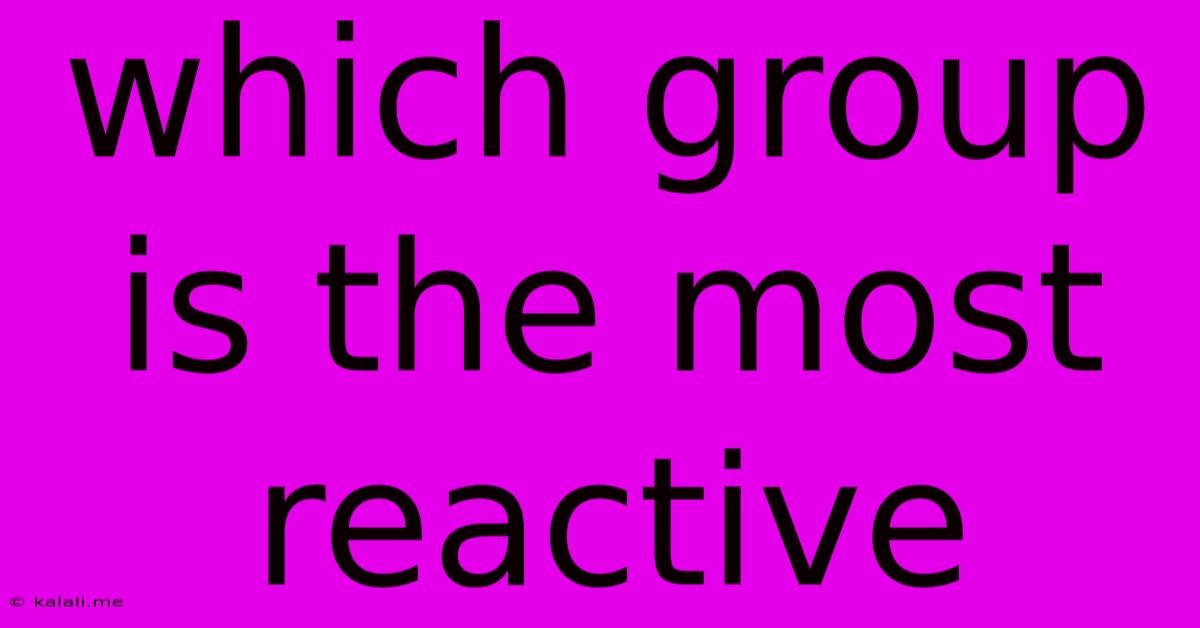Which Group Is The Most Reactive
Kalali
Jun 14, 2025 · 3 min read

Table of Contents
Which Group is the Most Reactive? Understanding Reactivity in the Periodic Table
The question of which group is the most reactive is a common one in chemistry, and the answer depends on whether you're talking about metals or nonmetals. This article will explore the reactivity of different groups in the periodic table, explaining the underlying principles and highlighting the most reactive elements within each category. Understanding this helps us predict chemical behavior and is fundamental to many chemical processes.
Alkali Metals (Group 1): The Most Reactive Metals
Undeniably, the alkali metals (Group 1) are the most reactive metals in the periodic table. These elements – lithium (Li), sodium (Na), potassium (K), rubidium (Rb), cesium (Cs), and francium (Fr) – all have one valence electron readily available for donation in chemical reactions. This single electron is loosely held, making it easy to lose and form a +1 ion. The larger the atom, the further this electron is from the nucleus, and the easier it is to remove, hence the increased reactivity down the group. Cesium and francium are particularly reactive, reacting violently with water and even air. Their reactions are often exothermic, producing significant heat and sometimes even flames. Alkali metals are highly electropositive, meaning they readily lose electrons.
Key characteristics driving their reactivity:
- Low ionization energy: Easy loss of the valence electron.
- Large atomic radius: The valence electron is further from the nucleus.
- Electropositive nature: Strong tendency to lose electrons.
Halogens (Group 17): The Most Reactive Nonmetals
Moving to the nonmetals, the halogens (Group 17) – fluorine (F), chlorine (Cl), bromine (Br), iodine (I), and astatine (At) – claim the title of most reactive nonmetals. These elements all have seven valence electrons, meaning they are only one electron short of a stable octet. This strong desire for an additional electron drives their reactivity. They readily accept an electron to form a -1 ion, engaging in strong ionic bonding with metals. Again, reactivity increases as you move up the group.
Factors influencing halogen reactivity:
- High electron affinity: Strong attraction for an additional electron.
- Small atomic radius (for fluorine): Increased attraction for electrons closer to the nucleus.
- Electronegativity: Tendency to attract electrons in a chemical bond. Fluorine is the most electronegative element.
Comparing Reactivity Across Groups
It's crucial to understand that reactivity isn't a single, easily quantifiable property. It depends on the specific reaction conditions and the elements involved. However, generally speaking:
- Alkali metals are far more reactive than alkaline earth metals (Group 2). While alkaline earth metals also readily lose electrons, they have two valence electrons, making the process slightly less spontaneous.
- Halogens are significantly more reactive than chalcogens (Group 16). Chalcogens need two electrons to complete their octet, while halogens only need one.
- Noble gases (Group 18) are extremely unreactive, possessing a full valence shell, making them stable and resistant to chemical reactions.
In conclusion, while defining the "most reactive" group requires specifying whether you're focusing on metals or nonmetals, the alkali metals are the most reactive metals, and the halogens are the most reactive nonmetals. Understanding the electronic configurations and periodic trends is key to comprehending these differences in reactivity.
Latest Posts
Latest Posts
-
Region Of Convergence Of Z Transform
Jun 15, 2025
-
Number Of Valence Electrons In Rubidium
Jun 15, 2025
-
What Is The Least Common Multiple Of 25 And 30
Jun 15, 2025
-
Is A Webcam An Input Device
Jun 15, 2025
-
Intellectual Disabilities Are Characterized By Significant Limitations Both In
Jun 15, 2025
Related Post
Thank you for visiting our website which covers about Which Group Is The Most Reactive . We hope the information provided has been useful to you. Feel free to contact us if you have any questions or need further assistance. See you next time and don't miss to bookmark.